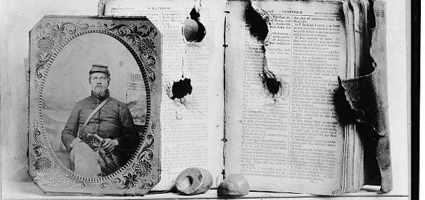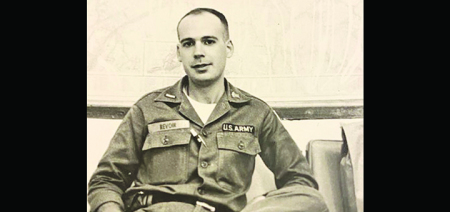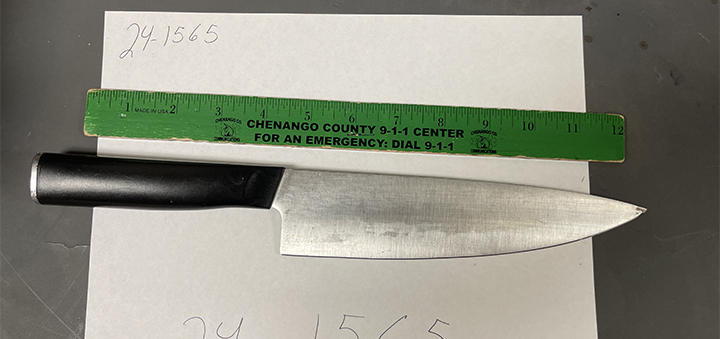Chenango In The Civil War: One Of The Fortunate Men
Published:
January 4th, 2013

Editor’s Note: In conjunction with the Chenango County Civil War Commemoration Project Team, The Evening Sun will present a monthly series chronicling items of local interest during the war between the states, compiled and written by a number of local history enthusiasts.
By Christine E. Buck
Smithville Historical Society President
In 1840, Walter Godfrey Jones was born into religion. His father was the Reverend A.B. Jones, a respected Baptist clergyman and farmer. Not only did Walter have an early religious start, but faith served him well during the Civil War.
When Walter was six years old, the Jones family moved from their Broome County home to Chenango County. Reverend Jones was engaged as the resident pastor of the small Baptist Church in Genegantslet, a hamlet in the Town of Greene. For a time, he also served two miles away at the Baptist Church in Smithville Flats.
The only boy in a family of six sisters, Walter had blue eyes, light hair, and a fair complexion. As an adult, he was tall, compared with many men. His height was five feet, ten and one-half inches. On Christmas Eve of 1859, at age nineteen, he became a married man. Miss Lola Nusom was his bride.
Walter was a farmer. He, his wife, and their year-old son Eddie lived in Smithville in the summer of 1862. The Civil War was raging. The Union Army called for additional troops to quell the rebellion, and the Town was responsible for raising fifty-two volunteer soldiers. If the County’s quota wasn’t met by September 1, men would be drafted into service. Each town was to do its part.
To generate volunteers, Smithville held motivational meetings – called War Meetings – with booming cannons, martial bands, and skillful speakers from around the County. The meetings were meant to arouse patriotism and motivate men to volunteer. At the meetings, citizens pledged funds to help promote enlistments.
Greene’s Chenango American newspaper articles of that time are a mix of community news – agricultural fairs, fires, and festivals – and war news, including deaths of soldiers from the area. One brief item reported that a recruiting officer from the 8th NY Cavalry Regiment was in the area, and “the opportunity for enlisting is yet open.” Walter G. Jones took that opportunity in Smithville and enlisted for three years. Walter, age twenty-two, a man with a wife and young son and farm work to be done. He was mustered in that same day. Lucy Jones, his stepmother, gave him a small pocket Bible to carry to the battlefront.
Two weeks later, Walter’s name appeared in the newspaper as one of a full company of recruits quartered in Greene – more than 100 men. They awaited their official orders to leave for the South. Mr. R.P. Barnard of Greene presented the men with “Soldiers Kits” that had been made by the Ladies’ Aid Society.
During the war, the 8th NY Cavalry performed constant, hard service. Their loss of officers and men was great. But because of his stepmother’s gift, Walter was one of the fortunate men.
At the Battle of Cedar Creek in Virginia, October 19, 1864, Walter was shot in the chest. In what should have been a fatal shot, the Bible he carried in his left pocket took the strike and stopped the bullet. Six months later, at the Battle of Appomattox (Lee’s surrender), he was shot with another bullet. Again, it struck the Bible and stopped. Each bullet entered the front cover and tore through the Bible’s pages, one traveling back to the Book of Revelations. Walter’s life was saved twice by the Bible given him by his stepmother.
Walter was discharged from service in Washington, DC in June of 1865. Despite some crippling injuries, he returned safely to a full life in Chenango County. He bought a farm in McDonough (just over the Smithville border) two years later. For many years, he farmed that land and later was a merchant in McDonough. In addition to the son born before he volunteered, he and Lola had three daughters.
The rest of his life, Walter told his Bible story to family, friends, and fellow soldiers. He preserved the Bible and the two bullets and declared that if the shots had been fired at a two-inch white oak board, they would have penetrated it.
In 1896 Walter attended a National Encampment in Boston, and he took along his treasured war souvenir. He was offered $200 for it. “I am a poor man,” he said, “but $5,000 wouldn’t buy it today.”
He had taken part in forty-two military engagements and lived to tell his story of the Bible until 1909. He and Lola are buried in the McDonough Union Cemetery.
Private Walter G. Jones had descendants through his children Eddie Jones, Lydia Jones Morse, and Carrie Jones Purdy. Some live in the area, and we’re told his story has been passed down through the generations. Walter, one of the fortunate men, would be pleased.
Comments





(1).jpg)

